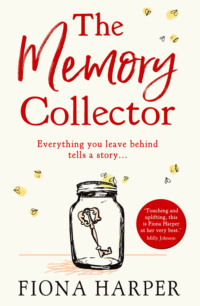
Полная версия
Oh-So-Sensible Secretary / Housekeeper's Happy-Ever-After: Oh-So-Sensible Secretary
‘I did. Maybe I should have asked you what you do like.’
‘I like my job.’
‘Being a secretary?’
I nodded. ‘Organisations like Gibson & Grieve don’t work unless executives have proper administrative back-up. I like organising things, checking details, pulling everything together. I like making sure everything is in its right place. That’s why I like filing. I find it satisfying.’
Phin didn’t say anything. He just looked at me across the table.
‘I’m sorry,’ I said, putting up my chin. ‘I do. Shoot me.’
He grinned at that. ‘So…an unexpectedly kind, nitpicking perfectionist with an irrational prejudice against poor punctuation and a bizarre attachment to filing. I think we’re getting somewhere. What else do I need to know about you?’
‘Nothing.’
‘Nothing? There must be more than that.’
I drank my coffee, unaccountably flustered. I was more thrown than I wanted to admit by the blueness of his eyes, by that lazy smile and the sheer vitality of his presence. There was a whole table between us, but I was finding it hard to breathe.
‘I really don’t know what you want me to tell you,’ I said. ‘I’m twenty-six, I share a flat in south London with a friend, and my life is the exact opposite of yours.’
His eyes gleamed at that, and he leant forward. ‘What do you mean?’
‘Well, you come from a wealthy family whose stores are a household name,’ I pointed out. ‘You make television programmes doing the kind of things the rest of us would never dare to do, and when you’re not skiing down a glacier or hacking through a jungle you’re at all the A-list parties—usually with a beautiful girl on your arm. The closest I get to an A-list party is reading about one in Glitz, and I’d rather stick pins in my eyes than set foot in a rainforest. We don’t have a single thing in common.’
‘You can’t say that,’ Phin objected. ‘You don’t really know anything about me.’
‘I feel as if I do,’ I told him. ‘My flatmate, Anne, is your biggest fan, and after listening to her talk about you for the past two years I could take a quiz on you myself.’ I pushed my empty cup aside. ‘Go on—ask me. Anything,’ I offered largely, and even gave him an example. ‘What’s your latest girlfriend called?’
A smile was tugging at the corner of Phin’s mouth. ‘You tell me,’ he said.
‘Jewel,’ I said triumphantly. ‘Jewel Stevens. She’s an actress, and when you went to some awards ceremony last week she wore a red dress that had Anne weeping with envy.’
‘But not you?’
‘I think it would have looked classier in black,’ I said, and Phin laughed.
‘I’m impressed. Clearly I don’t need to tell you anything about myself, as you know it all already. Although I think I should point out that Jewel isn’t, in fact, my girlfriend. We’ve been out a couple of times, but that’s all. There’s no question of a real relationship, whatever the papers say.’
‘I’ll tell Anne. She’ll be delighted,’ I said. ‘She’s got a very active fantasy life in which you figure largely, in spite of the fact that she’s very happy with her fiancé, Mark.’
‘And what do you fantasise about, Summer?’ asked Phin, his eyes on my face.
Ah, my fantasies. They were always the same. Jonathan realising that he had made a terrible mistake. Jonathan telling me he loved me. Jonathan asking me to marry him. We’d buy a house together. London prices being what they were, we might have to go out to the suburbs, and even pooling our resources we’d be lucky to get a semi-detached house, but that would be fine by me. I didn’t need anywhere grand. I just wanted Jonathan, and somewhere I could stay.
I realise a suburban semi-detached isn’t the stuff of most wild fantasies, but it was a dream that had kept me going ever since Jonathan had told me before Christmas that he ‘needed some space’. He thought it was better that we didn’t see each other outside the office any more. He knew how sensible I was, and was sure I would understand.
I sighed. What could I do but agree that, yes, I understood? But I lived for the brief glimpses I had of him now, and the hope that he might change his mind.
Phin was watching me expectantly, his brows raised, and I had an uneasy sense that those blue eyes could see a lot more than they ought to be able to. He was still waiting for me to answer his question.
Jonathan had been insistent that we keep our relationship a secret at the office, so I hadn’t told anyone. I certainly wasn’t going to start with Phin Gibson.
‘I want a place of my own,’ I said. ‘It doesn’t have to be very big—in fact I’ll be lucky if I can afford a studio—but it has to be mine. It has to be somewhere I could live for ever.’ I glanced at him. ‘I suppose you think that’s very boring?’
‘It’s not what I was expecting, and it’s not a fantasy I understand, but it’s not boring,’ said Phin. ‘I don’t find much boring, to tell you the truth. People are endlessly interesting, don’t you think? Obviously not!’ he went straight on, seeing my sceptical expression. ‘Well, I find them interesting. Why is it so important for you to have a home of your own?’
‘Oh…I moved around a lot as a child. My mother has always been heavily into alternative lifestyles, and she’s prone to sudden intense enthusiasms. One year we’d be in a commune, the next we were living on a houseboat. When my father was alive we had a couple of freezing years in a tumbledown smallholding in Wales.’
It was odd to find myself telling Phin Gibson, of all people, about my childhood. I didn’t normally talk about it much—not that it had been particularly traumatic, but it was hard for most people I knew to understand what it was like growing up with a mother who was as charming and lovely and flaky as they come—and there was something about the way he was listening, his expression intent and his attention absolutely focused on me, that unlocked my usual reserve.
‘Wales was the closest we ever got to settling down,’ I told him. ‘The rest of the time we kept moving. Not because we had to, but because my mother was always looking for something more.
‘Basically,’ I said, ‘she’s got the attention span of a gnat. I lost count of the schools I attended, of the weird and wonderful places we lived for a few months before moving on.’
I turned the cup and saucer between my fingers. ‘I suppose it’s inevitable I grew up craving security the way others crave excitement. My mother can’t understand it, though. She’s living in a tepee in Somerset at the moment, and for her the thought of buying a flat and settling down is incomprehensible. I’m a big disappointment to her,’ I finished wryly.
‘There you are—we’ve something in common after all,’ said Phin, sitting back with a smile and stretching his long legs out under the table. ‘I’m a big disappointment to my parents, too.’
Chapter Two
I LOOKED at him in surprise. ‘But you’re famous,’ I said. I’d known Lex wasn’t impressed by his younger brother, but had assumed that his parents at least would be pleased by his success. ‘You’ve had a successful television career.’
‘My parents aren’t impressed by television.’ Phin smiled wryly. ‘They think the media generally is shallow and frivolous—certainly compared to the serious business of running Gibson & Grieve. Lex and I were brought up to believe that the company was all that mattered, and that it was the only future we could ever have or ever want.’
‘When did you change your mind?’
‘When I realised that there wasn’t really a place for me here. Lex is older than me, and anyway he had Chief Executive written all over him even as a toddler. Gibson & Grieve was all he ever cared about.’
It was my turn to study Phin. He was looking quite relaxed, leaning back against the banquette, but I sensed that this wasn’t an easy topic of conversation for him.
‘Didn’t you ever want to be part of it, too?’
‘As a very small boy I used to love going into the office,’ he admitted. ‘But as I got bigger I didn’t fit. I was always being told to be quiet or sit still, and I didn’t like doing either of those things. I wanted to skid over the shiny floors, or play football, or fiddle with the new computers. After a while I stopped going.’
Phin’s smile was a little crooked. ‘Of course it’s easy now to see that I was just a spoilt brat looking for attention, but at the time it felt as if I were reacting against all their expectations. Lex was always there, doing what he should, and there never seemed any point in me doing the same. I got into as much trouble as I could instead,’ he said. ‘My parents were beside themselves. They didn’t know what to do with me, and I didn’t know what to do with myself. I don’t think they ever thought I would get a degree, and I took off as soon as I’d graduated. I suspect that they were glad to be rid of me! I mean, what would they have done with me at Gibson & Grieve? I didn’t fit with the image at all!’
No, he wouldn’t have done, I thought. In spite of its commitment to style, Gibson & Grieve was at heart a very solid, traditional company—it was one of the reasons I liked it—and Phin would have been too chaotic, too vibrant, too energetic to ever properly fit in.
‘So what did you do?’ I asked, wondering how he was going to fit in now that he was back.
‘I messed around for a few years,’ he said. ‘I worked my way around the world. I didn’t care what I did as long as I was somewhere I could keep my adrenalin pumping—skiing, sailing, whitewater rafting, climbing, sky-diving…I tried them all. I spent some time in the Amazon and learnt jungle survival skills, and then I got a job leading a charity expedition, and that led onto behind the scenes advice on a reality TV programme.’
He shrugged. ‘It seems I came across well on camera, and the next thing I knew they’d offered me my own programme, taking ill-assorted groups into challenging situations.’
And I knew what had happened after that. It had taken no time at all for Phin Gibson to become a celebrity, almost as famous as Gibson & Grieve itself.
‘And now you’ve joined the company,’ I said.
‘I have.’ Phin was silent for a moment, looking down at his hands, which lay lightly clasped on the table, and then he looked up at me and the blueness of his eyes was so intense that I actually drew a sharp breath.
‘Last year I took a group of young offenders on a gruelling trek through Peru,’ he said.
I remembered the programme. I had watched it with Anne, and even I had had to admit that the change in those boys by the end of the trek was extraordinary.
‘I recognised myself in them,’ Phin said. ‘It made me think about how difficult it must have been for my parents. I guess I’d grown up in spite of myself.’
His mouth quirked in a self-deprecating grin, then he sobered. ‘My father had a stroke last year as well. That put a new perspective on everything. It seemed to me that it was time to try and make some amends. My mother has got it into her mind that all Dad wants is for me to settle down and take up my inheritance at Gibson & Grieve.’
He sighed a little. ‘To be honest, it’s a little hard to know exactly what Dad wants now, but he did manage to squeeze my hand when my mother told him what she had in mind. Basically, a certain amount of emotional blackmail is being applied! In lots of ways it’s worse for Lex,’ Phin went on thoughtfully. ‘He stepped into my father’s shoes as Chief Executive, and he’s been doing a good job. Profits are up. Everyone’s happy. The last thing he wants is me muddying the waters. In the end he suggested that we capitalise on my “celebrity”, for want of better word, and make me the new face of Gibson & Grieve. You know we’ve just acquired Gregson’s?’
He cocked an eyebrow at me and I nodded. The acquisition had made the headlines a few months ago when it happened.
‘Supermarkets are a change of direction for us,’ Phin went on. ‘Our brand has always been up-market, even exclusive, and we need more of a popular, family-friendly image now. Lex seems to think I can help with that, and I agreed to see how it went for a year initially, on condition that I could finish a couple of filming commitments.’
I smoothed my skirt over my knees. I was feeling a bit bad, if you want the truth. I’d dismissed Phin as a spoilt celebrity and assumed that he was choosing to dabble in the family business for a while. I hadn’t realised that he was under some pressure.
‘It makes sense for you to be Director of Media Relations,’ I offered.
‘I think we all know how little that means,’ said Phin, leaning across the table, and I found myself leaning back as if pushed there by the sheer force of his personality. ‘Lex’s idea is to shunt me off and just wheel me out to be photographed every now and then. As far as he’s concerned all the media relations will be done by his PR guy…what’s his name? John?’
‘Jonathan Pugh.’
Just saying his name was enough to bump my heart into my throat, and my tongue felt thick and unwieldy in my mouth. I wondered if Phin would notice how husky I sounded, but he didn’t seem to.
‘Yep, that’s him,’ was all he said, sitting back again. ‘A born suit.’
I bridled at the dismissive note in his voice. I’d been quite liking Phin until then, but I was very sensitive to any criticism of Jonathan. At least Jonathan dressed professionally, unlike some people I could mention, I thought, eyeing Phin’s T-shirt disapprovingly.
‘Jonathan’s very good at his job,’ I said stiffly.
‘Lex wouldn’t employ him unless he was,’ said Phin. ‘But if he’s that good there won’t be much left for me to do, will there? I’m not going to spend a year opening stores and saving Lex the trouble of turning up at charity bashes.’
‘Then why come back if you’re not going to do anything?’ I asked, still ruffled by his dismissal of Jonathan.
‘But I am going to do something,’ he said. ‘Lex just doesn’t know it yet. If I’m going to be part of Gibson & Grieve, I’m going to make a difference.’
Oh, dear. I had a nasty feeling this was the kind of thing Lex had meant when he had told me to stop Phin doing anything stupid.
‘How?’ I asked warily.
‘By increasing our range of fair trade products. Promoting links with communities here and overseas. Being more aware of environmental issues. Developing our staff and providing more training. Making connections,’ said Phin. ‘We’re all part of chain. It doesn’t matter if we’re picking tea in Sri Lanka, stacking it on the shelves in Sheffield or buying it in Swindon. We should be celebrating the connections between people, not pretending that the only thing that matters is underlying operating profit or consensus forecasts.’
I was secretly impressed that Phin even knew about consensus forecasts, but I couldn’t see any of this going down well with Lex.
I nibbled my thumb. It’s a bad habit of mine when I’m unsure. ‘And you haven’t discussed any of this with your brother yet?’
‘Not yet, no,’ he said. ‘I wanted to get to know you first.’
‘Me?’ I was taken aback. ‘Why?’
‘Because if I’m going to get anything done I need a team. I need to be sure that we can work together, and that we share the same goals.’
The blue, blue eyes fixed on me with that same unnerving intensity. ‘You’ve been working for Lex, and I know his staff are all very loyal to him. I’m not trying to take over, but there’s no use pretending he’s going to share my ideas, and I don’t want to put you in a difficult position. If you’d rather not work with me to change things, this is the time to say, Summer. I’m sure Lex would give you your old job back if you wanted it, and there’d be no hard feelings.’
I’ll admit it. I hesitated. There was part of me that longed to go back to the Chief Executive’s office—which buzzed with drive, where everyone was cool and efficient, and where there was no Phin Gibson with his unsettling presence and alarming ideas about change. I didn’t like change. I’d had enough of change as a child. I wanted everything to stay the same.
But this was my big chance. When Anne got married I was going to have to move out of the flat. With my new salary I might be able to save enough to put down a deposit on a place of my own by then. It was only for a year, too, I reminded myself. When it was up, I’d be in a good position to get another job at the same level in spite of my age. It would be worth putting up with Phin until then.
So I met the blue eyes squarely. ‘I don’t want my old job back,’ I said. ‘I want to be part of your team.’
I was sorting through the post the next morning when Phin appeared. Late again. Hadn’t he ever heard of a nine-to-five day at work?
He had spent no more than a couple of hours in the office after we had got back from Otto’s, before disappearing to a meeting with his producer.
‘But I’ve read all my e-mails, you’ll be glad to hear,’ he said as he left. ‘I take back everything I said about never being bored. All that corporate jargon puts me to sleep faster than a cup of cocoa. I’m never going to make it through a meeting if these guys actually talk like that.’
It would be nice to think he would ever be there to go to a meeting, I thought crossly.
It was after ten, and I had been in a dilemma about when to have the doughnut I’d bought earlier at Otto’s. Having forgone my treat the day before, I was determined not to miss out again, but I wanted a few minutes to myself, so that I could enjoy it properly. I needed Phin to be in his office, so that I knew where he was.
Not knowing when he might appear had been making me twitchy, so when Phin strolled in and wished me a cheerful good morning I glared at him over the top of my glasses.
‘Where have you been?’ I demanded.
‘You know,’ Phin confided, ‘that librarian thing you’ve got going really works for me.’
‘What librarian thing?’ I asked, thrown.
‘The fierce glasses on the chain, the scraped back hair, the neat suit…’ He grinned at my expression, which must have been dumbfounded. That’s certainly how I felt. ‘Please say you’re about to shake out your hair and tell me you’re going to have to be very strict with me for being late!’
I’d never met anyone like Phin before, and I was completely flummoxed. ‘What on earth are you talking about?’
‘Never mind,’ he said. ‘I was just getting a bit carried away there. What was it you wanted to know again?’
‘I was wondering where you’d been,’ I said tightly. ‘It’s after ten. I was expecting you here an hour ago at least.’
‘I went into the Oxford Street store to see how things are going,’ said Phin casually, picking up the post from my desk and leafing idly through it. ‘I thought it would be an idea to meet the staff and hear what they think, and it was very useful.’ He looked up at me, his eyes disconcertingly blue and amused. ‘Why? Should I have asked permission?’
I pressed my lips together. ‘It’s not a question of permission,’ I said. ‘But there’s no point in having a PA unless you let me know where you are. I need to be able to make appointments for you, and I can’t do that if I’ve no idea when you’re going to turn up.’
‘Who wants an appointment?’
‘Well, no one, as it happens,’ I was forced to admit. ‘But they might have done. It’s a matter of principle.’
‘Principle? That sounds serious.’ Phin dropped the post back onto the desk and without thinking I squared up the pile, looking up when he sucked in his breath alarmingly.
‘What’s the matter?’ I asked, startled.
‘I don’t know…’ He was squinting at the pile I’d tidied. ‘I think those papers at the bottom might be half a millimetre out of alignment.’
‘Sarcasm—excellent,’ I said. Sarcastically. That was all I needed. ‘Thank you so much.’
He held up his hands. ‘It’s nothing, honestly. Just one more service we offer.’
My lips tightened. I tried to pick up the conversation. ‘Perhaps we should agree a system.’
‘A system,’ said Phin, testing the word as if he’d never heard it before. ‘Fine. What sort of system?’
‘If you let me have your mobile number, so that I can get hold of you if I need to, that would be a start. And then perhaps we could sit down and go through your diary.’
‘Absolutely. Let’s do it.’ He clenched his fist and punched it in the air, to demonstrate an enthusiasm I was perfectly aware he didn’t feel. ‘Let’s do it now, in fact.’
‘Fine.’
We exchanged mobile numbers, and then I carried the diary into his office. I would put all the details on the computer later, but it was easier at this stage to use an old-fashioned hard copy.
I sat down with the diary on my knee, while Phin fished out a personal organiser and leaned back in his chair so that he could prop his feet on the desk.
‘What do you want to know?’
‘I’d better have everything.’ I smoothed the page open, admiring in passing how nice my hands looked. I take care of my nails, and today they were painted a lovely pale pink called Dew at Dawn. ‘If you’re the face of Gibson & Grieve, you’ll be expected to appear at various functions and I’ll need to know when you’re available.’
‘Fair enough.’
He had an extraordinarily complicated social life, with two or three events an evening as far as I could make out. I couldn’t help comparing it with my own , which largely consisted of painting my nails in front of the television, watching Anne getting ready to go out with Mark and feeling miserable about Jonathan.
‘This is great,’ said Phin when we’d finished. ‘I never need to remember anything by myself ever again. Maybe I won’t mind being an executive after all. What else is there to do?’
‘There’s a meeting to discuss the new media strategy at half past ten,’ I said, handing him a folder. ‘Your brother suggested you went along if you were here on time. I’ve noted all the salient points, and included copies of recent minutes so you know the background.’
‘Salient points?’ he echoed, amazed. ‘I didn’t realise people still said things like that any more!’
I chose to ignore that, and looked pointedly at my watch instead. ‘You should get going. You’ve only got a couple of minutes and you don’t want to be late.’
‘You mean you don’t want me to be late,’ said Phin, but he swung his legs down from the desk.
I could hardly wait for him to go. I practically shoved him out of the door towards the lifts. Lex’s office was on the floor above, and as soon as I saw him step into the lift I scurried down the corridor to the kitchen to make myself some coffee.
My office, and Phin’s of course, was in a prime location on the corner of the building, with fabulous views of Trafalgar Square, but more importantly we were at the end of the corridor, which meant that nobody dropped in just because they were passing.
Even so, I closed the door as a precaution and prepared to enjoy my doughnut in private. I settled happily behind my desk with my coffee and cleared a space. Eating a doughnut could be a messy business. Perhaps that was why it always felt faintly naughty to me.
At last. I pulled out the doughnut and took a bite, mumbling with pleasure as my teeth sank into the sugary dough.
And then froze as the door opened and Phin came in. ‘I forgot that file—’ he began, and then it was his turn to stop as he took in the sight of me, sitting guiltily behind my desk, doughnut in hand and mouth full.
His eyes lit with amusement. ‘Aha! Caught red-handed, I see.’
Blushing furiously, I dropped the doughnut and brushed at the sugar moustache I could feel on my top lip. ‘I thought you’d gone,’ I blustered, mortified at having been caught in such an unprofessional pose.
‘Now I know why you were so keen to get rid of me,’ said Phin. ‘This is a new side to you. How very, very unlikely. Who would have thought that sensible Summer Curtis would have a doughnut addiction!’ He leant conspiratorially towards me. ‘Does anyone else know?’
‘It’s not an addiction,’ I said, trying for some dignity. ‘I just work better if I’ve had some sugar in the morning.’






